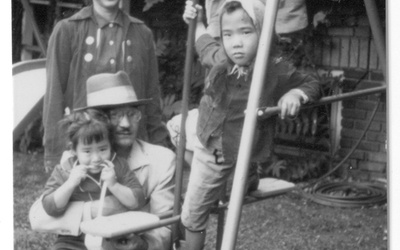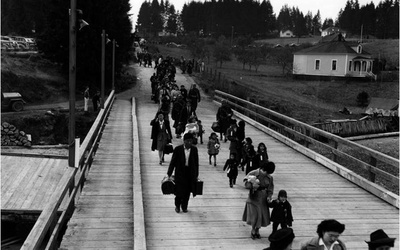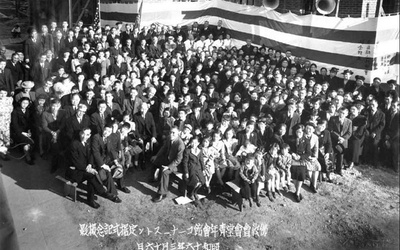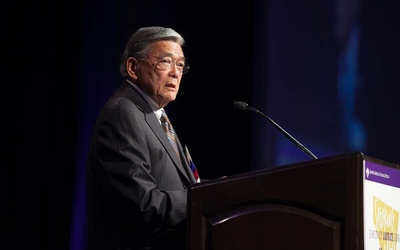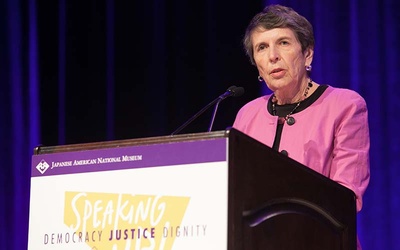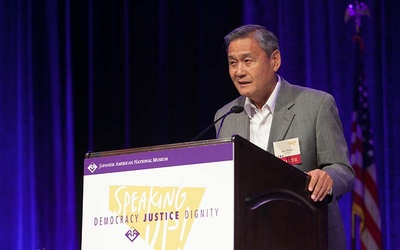Speaking Up! Democracy, Justice, Dignity
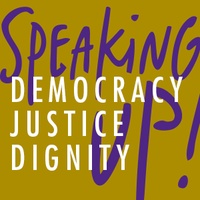
For the 25th anniversary of the Japanese American Redress legislation, the Japanese American National Museum presented its fourth national conference “Speaking Up! Democracy, Justice, Dignity” in Seattle, Washington from July 4 to 7, 2013. This conference brought fresh insights, scholarly analysis, and community perspectives to bear on the issues of democracy, justice, and dignity.
These articles stem from the conference and detail the Japanese American experiences from different perspectives.
Visit the conference website for program details >>
Stories from this series
A Daughter’s View of Minoru Yasui, “Civil Rights Hero”
Jan. 8, 2014 • Holly Yasui
My dad Minoru Yasui was always, or almost always my hero. But of course that was not true for everyone, nor at all times. When he initiated his test case in 1942, he was not considered a hero. The press labeled him a treacherous Jap spy, and the National Secretary of the Japanese American Citizens League (JACL) called him “a self-serving martyr … seeking headlines.” In 1944, when he visited the Heart Mountain draft resisters to try to persuade them …
Japanese Americans in Seattle
Nov. 25, 2013 • Tom Ikeda
I’ve been asked to talk about the history of Seattle’s Japanese American community. And because Densho has 750 oral history interviews and thousands of historic photographs, I thought it would be easy to pick out a few stories to share with you today. But the more I thought about the task, the more overwhelmed I became over the many choices. For example, I could talk about the Issei pioneers who came to Seattle in the 1880s and who worked in …
In My Parents’ Words – Issei Voices from Department of Justice Camps
Nov. 4, 2013 • Satoru Ichikawa
My father was the resident minister of the Seattle Buddhist Church. The construction of the temple on 14th Avenue & Main Street was nearing completion. It carried a heavy mortgage and payments had to be made. A cornerstone laying ceremony was held on March 16, 1941. These jubilant members had no idea that WWII would start later that year to disrupt their lives. War broke out between Japan and the U.S. with the bombing of Pearl Harbor, HI on December …
Keynote Address at Japanese American National Museum’s National Conference on July 6, 2013 in Seattle, Washington
Oct. 29, 2013 • Norman Y. Mineta
You know, this evening I was originally supposed to speak here tonight in a conversation with Senator Daniel K. Inouye. But as all of us know, our community and our nation suffered a very great loss with his passing and that loss is definitely felt tonight. Of all the stories that I’ve ever heard or could tell about our great friend, Senator Dan Inouye, there is one that will always stand out in my mind. In the darkest days of …
Rising Above Racism After World War II: The Lives of Three Unforgettable Asian-American judges
Oct. 21, 2013 • Mary M. Schroeder
I am honored to have been asked to speak to you this morning. I accepted your invitation in a heartbeat because this celebration is important to me. As you know, I became a student of the “internment,” albeit inadvertently, as a result of Gordon Hirabayashi’s court case in the 1980s seeking to overturn his wartime conviction for violating “internment” orders. We gathered here in Seattle a year and a half ago to celebrate the 25th anniversary of our court’s opinion …
Legacy of Redress: Stand Up, Speak Out!
Oct. 14, 2013 • Alan Nishio
I was born in Manzanar on August 9, 1945, the day that the United States dropped a second atomic bomb on Nagasaki, Japan. Three days earlier, the United States had dropped the first atomic bomb on Hiroshima, where my grandfather died as a result of the bomb. Like many of you here, I came of age in the 1960s. In my first year at UC Berkeley, I became involved in the Free Speech Movement, and then later became involved in …

